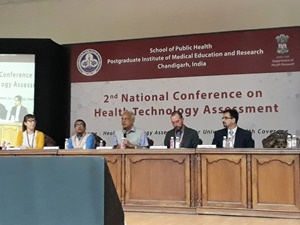Overcoming Barriers: Financing and Service Delivery for Vaccination in Fragile and Conflict-Affected States


From 23rd to 25th February 2018, three members from HITAP’s International Unit (HIU) went to Chandigarh, India. Two separate events occurred in Chandigarh during this time. The first was the 7th International Fellowship on Health Technology Assessment, a week-long HTA training workshop from 19th to 23rd February for members of organisations who will be involved in conducting HTA studies in India. This was followed by the 2nd National HTA Conference on 24th and 25th February which hosted eminent speakers from India and abroad, and was attended by HTA users, HTA generators, pharmaceutical companies and donors, as well as eager students from the Post Graduate Institute for Medical Education and Research (PGIMER) where the event was held. The two events were organised by PGIMER and supported by partners including the International Decision Support Initiative (iDSI).
on Health Technology Assessment, a week-long HTA training workshop from 19th to 23rd February for members of organisations who will be involved in conducting HTA studies in India. This was followed by the 2nd National HTA Conference on 24th and 25th February which hosted eminent speakers from India and abroad, and was attended by HTA users, HTA generators, pharmaceutical companies and donors, as well as eager students from the Post Graduate Institute for Medical Education and Research (PGIMER) where the event was held. The two events were organised by PGIMER and supported by partners including the International Decision Support Initiative (iDSI).
This is an exciting time for HTA and health in India. India strives to achieve universal health coverage (UHC) and recognises HTA as a powerful tool to help achieve this. A new body, HTAIn, has been established to oversee HTA in India, and a system has been developed for how HTA will be conducted across the country (Link). The system comprises an impressive network of government organisations, regional resource hubs, and technical partners. The system is still at a nascent stage and eight HTA topics have been assigned to Technical Partners, who are now in the process of conducting these first HTAs.
The feeling in Chandigarh was one of excitement and eagerness. You could sense the momentum. Approximately 200 stakeholders had come from all over India to attend, and the conference was used as an opportunity to present the first completed HTA study which was done by PGIMER  on Safety Engineered Syringes (SES) for Therapeutic use in India.
on Safety Engineered Syringes (SES) for Therapeutic use in India.
In addition to more than 20 oral presentations by researchers conducting HTA-related studies, over 40 plenary talks were given during the conference. These included speeches from Mr Gauba, the Joint Secretary of the Department of Health Research (DHR) who is in charge of overseeing HTA in India, Professor Karl Claxton, an eminent Health Economist from the University of York and a founding member of the NICE Technology Appraisal Committee in the UK, and Dr. Shankar Prinja, Additional Professor of Health Economics at PGIMER and organiser of the conference. HITAP staff also presented on three topics: the role of HTA for universal health coverage in Thailand, a study on the methodological issues faced by researchers in conducting HTA in low and middle-income countries (LMICs) and the results of a survey conducted to understand the application of HTA in India.
Key themes that emerged during the conference:
The first key theme was the opportunity for HTA to improve health outcomes India. All health programmes must decide how to invest and HTA can help achieve the maximum health with the finite resources available. The discussion covered concepts of thresholds and opportunity costs, highlighting how providing costly interventions can lead to the displacement of more cost-effective options and reduce the overall health of the population. For this reason, HTA and maximising health are inextricably linked.
The second theme that emerged was the central importance of equity in Indian healthcare provision. HTA is not purely about health outcomes per dollar or rupee but is a holistic approach which takes into account broader ethical concerns and aims to reflect the priorities of stakeholders. Senior Indian officials spoke ardently on the importance reducing out of pocket expenditures, the need for government to utilise resources to ensure that no person is impoverished through health expenditure, how every person should have access to healthcare regardless of ability to pay, and how reducing inequality is a moral imperative. It was felt that equity should be a central element of all HTA discussions concerning healthcare in India.
The issue of context and sequencing also received considerable attention. HTA is only one element in the creation of a good healthcare system. Other issues concern ensuring geographical access to health services, the availability of doctors/ medicines/ diagnostics, and the quality of available healthcare services. Indeed, HTA is not a prerequisite for UHC and many countries have achieved UHC before establishing rigorous HTA systems. It was also discussed how constraints and bottlenecks in the healthcare system may limit the ability to implement HTA results, limiting the use of such studies. The question of sequencing and priorities, therefore, came to the fore and speakers emphasised that HTA studies must be viewed within the broader context.
 A final major point of discussion concerned the constraints that India still faces in the implementation of quality HTA. The main constraint cited is lack of data. At present, there is limited health system cost data in India. There are movements to overcome this constraint, with PGIMER working to construct a cost database and a proposed study to create an Indian specific value set for quality-adjusted life year (QALY) calculations. However, establishing reliable, comprehensive data on which to base HTAs remains the biggest challenge facing HTA in India going forward.
A final major point of discussion concerned the constraints that India still faces in the implementation of quality HTA. The main constraint cited is lack of data. At present, there is limited health system cost data in India. There are movements to overcome this constraint, with PGIMER working to construct a cost database and a proposed study to create an Indian specific value set for quality-adjusted life year (QALY) calculations. However, establishing reliable, comprehensive data on which to base HTAs remains the biggest challenge facing HTA in India going forward.
The conference in Chandigarh was a unique opportunity for HTA stakeholders to come together and share their experiences. The event created a space for lively and probing discussion and contributed to the development and progress of HTA